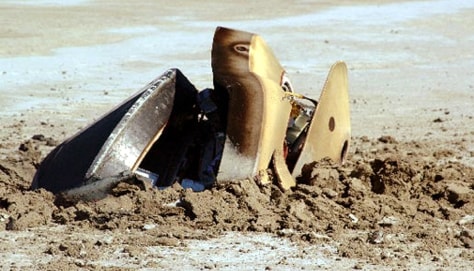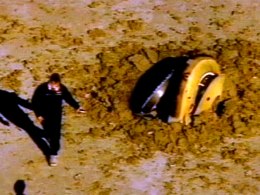

Posted on 10/03/2015 8:35:35 AM PDT by JimSEA
The search for life beyond Earth is one of the grandest endeavors in the history of humankind -- a quest that could transform our understanding of our universe both scientifically and spiritually.
. . .
The search for life beyond Earth is one of the grandest endeavors in the history of humankind -- a quest that could transform our understanding of our universe both scientifically and spiritually.
(Excerpt) Read more at sciencedaily.com ...
Sorry, I screwed up. Second and third paragraphs should be:
In the journal Astrobiology, Olcott-Marshall recently has published an analysis of Eocene rocks found in the Green River Formation, a lake system extending over parts of Colorado, Utah and Wyoming.
Marshall and co-author Nicholas A. Cestari, a masters student in her lab, found these Green River rocks have features that visually indicate the presence of life, and they argue that probes to Mars should identify similar indicators on that planet and double-check them through chemical analysis.
“Rock samples from Western US”. Like the Beach Boys? Grassroots? Doobie Brothers? :>}
What would help us most to understand the chemical origin of life would be a pre-DNA type on Mars.
Assuming, of course, that the rocks aren’t filled with bacteria that would be pathogens to terrestrial life...
You’d need an isolation protocol like we had after the moon shot, etc.


I’m reminded of Werner von Braun’s trip to the Antarctic in 1967 to fetch “Moon rocks” when he realized that there was no way the Moon landings were possible. The Moon landings were faked at a Hollywood sound stage in Area 51.
OTOH, von Braun did build some great rockets.
even in 2004 the re entry methods envisioned for a Mars mission was quite different than the Genesis program. As currently envisioned, the Mars Sample Return mission uses a completely passive entry vehicle -- that is, hardware holding the specimen canister would be aerodynamically stable through landing on Earth. The MSR entry craft would not use or require a parachute, Adler explained.
"The samples of Martian rock and soil would be in a container designed to withstand the impact and maintain its integrity as well as the integrity of the samples," Adler said.
During the local summer of 1966-67, von Braun participated in a field trip to Antarctica, organized for him and several other members of top NASA management.[83] The goal of the field trip was to determine whether the experience gained by US scientific and technological community during the exploration of Antarctic wastelands would be useful for the manned exploration of space. Von Braun was mainly interested in management of the scientific effort on Antarctic research stations, logistics, habitation and life support, and in using the barren Antarctic terrain like the glacial dry valleys to test the equipment that one day would be used to look for signs of life on Mars and other worlds. Wernher von Braun, NASA career
Exploring Antarctica (1967)
Intrigued by exploration in space and on Earth, Dr. Von Braun participated in an expedition to Antarctica. This photo was made on or about January 7, 1967.
Disclaimer: Opinions posted on Free Republic are those of the individual posters and do not necessarily represent the opinion of Free Republic or its management. All materials posted herein are protected by copyright law and the exemption for fair use of copyrighted works.